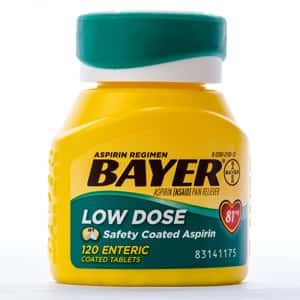
Strokes are nasty business. When a blood clot lodges in a brain artery, it leads to the death of neurons. Depending upon where the damage occurs, patients can have difficulty speaking, moving or balancing. People who have had a stroke due to a clot are more susceptible to another one. That’s why doctors try very hard to prevent repeat blood clots in this highly susceptible population. A new study asked a key question: is aspirin better than Xarelto?
Testing Aspirin Against Xarelto:
Investigators wondered whether the new anticoagulant Xarelto, known generically as rivaroxaban, would be more effective and safer than old-fashioned aspirin. A study published in the New England Journal of Medicine (May 16, 2018) compared a daily dose of 15 mg of Xarelto to 100 mg of aspirin.
The researchers recruited 7,213 volunteers from 31 countries. There were a total of 459 medical centers involved. This was a big and expensive study! It was supposed to last for at least two years. The investigators hypothesized that an anticoagulant like Xarelto would work better than an anti-platelet drug such as aspirin in preventing a second stroke.
Platelets are the sticky part of blood that can clump together to form clots. Aspirin prevents platelets from sticking together. That is why it is sometimes prescribed after someone experiences a TIA (transient ischemic attack) or mini stroke.
Was Aspirin Better Than Xarelto?
There was a lot riding on this clinical trial. The drug companies spent a lot of money trying to answer a huge question: Is Xarelto better than aspirin or is aspirin better than Xarelto? A month’s worth of aspirin can cost under $5.00. Xarelto can run over $500 for a month’s supply.
One might have guessed that Xarelto would have won such a contest hands down. At 100 times the price, we could have hoped for a substantially more effective and safer outcome from Xarelto.
The Big Oops!
This drug trial had to be stopped early. Such a decision was not made lightly. Not only was a lot of money riding on the outcome, lives were at stake. The outcome would influence prescribing patterns for years to come.
The NAVIGATE ESUS trial (New Approach Rivaroxaban Inhibition of Factor Xa in a Global Trial versus ASA to Prevent Embolism in Embolic Stroke of Undetermined Source) was ended prematurely (after 11 months) because people taking Xarelto were at higher risk of major bleeding. In addition, Xarelto was no more effective than aspirin at preventing stroke recurrence.
In Their Own Words, the Authors Stated:
“Major bleeding occurred in 62 patients in the rivaroxaban group (annualized rate, 1.8%), as compared with 23 in the aspirin group (annualized rate, 0.7%). The rate of life-threatening or fatal bleeding was significantly higher in the rivaroxaban group than in the aspirin group (hazard ratio, 2.34), as were the rates of symptomatic intracranial hemorrhage (hazard ratio, 4.02) and clinically relevant nonmajor bleeding (hazard ratio, 1.51).”
Translating that into English, Xarelto was significantly more likely to cause severe or life-threatening bleeding episodes compared to aspirin.
This is not the first time that Xarelto did not live up to expectations. Here is a study that compared aspirin to Xarelto after hip or knee replacement surgery:
The People’s Pharmacy Perspective:
It no doubt came as a great shock to the drug company sponsors of this stroke research to learn that their pricey anticoagulant was neither more effective nor safer than aspirin. We would actually answer the question: is aspirin better than Xarelto? in the affirmative. That’s because this extremely inexpensive OTC drug was less likely to cause hemorrhages. Although it may not have been more effective than Xarelto at preventing another stroke, it clearly won the race on safety.
What are patients to make of this study? First, no one should EVER stop taking Xarelto without very careful medical supervision. In one Xarelto commercial the announcer makes it crystal clear:
“Don’t stop taking Xarelto without talking to your doctor as this may increase risk of stroke.”
There are many health conditions where Xarelto may be an appropriate option. Only the prescribing physician can determine the best course of action. That said, it is important for doctors to familiarize themselves with this new study. If they are trying to prevent a second blood clot to ward off another stroke, they may wish to consider old-fashioned aspirin as a viable option. The study in the New England Journal of Medicine will have an important impact on prescribing patterns for years to come.
Learn more about Xarelto and Eliquis side effects at this link.
Share your own experience with Xarelto in the comment section below.

